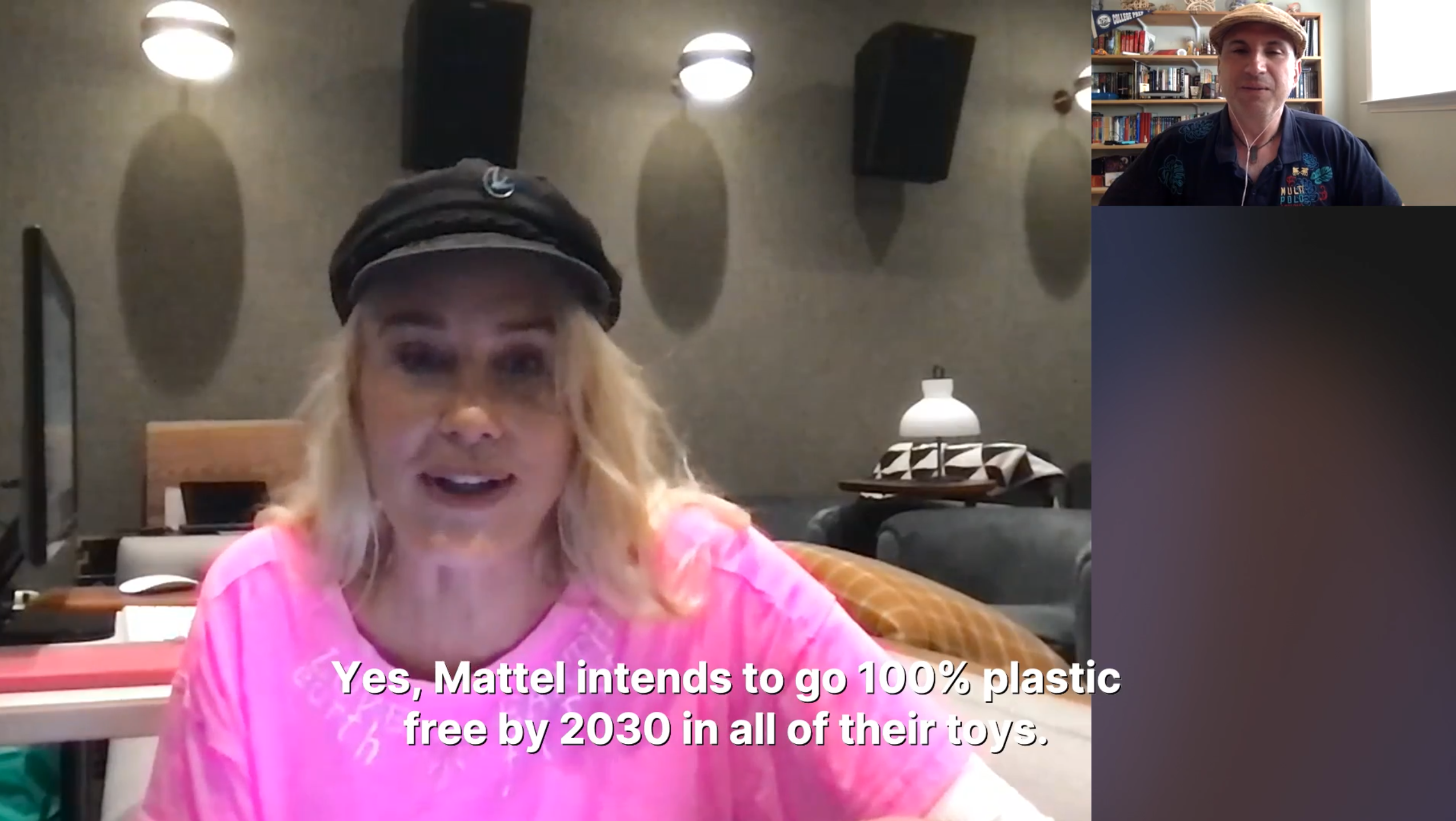Daryl Hannah, Barbie, and Quaker Tricksters
These interviews are included in the September 2023 Quakers Today podcast.Let’s play two truths and a lie. You guess which is the lie.
American actress Daryl Hannah recently made a significant announcement about the Mattel Corporation. Mattel had declared its intention to become plastic-free in all toys by 2030. I had a Zoom conversation with Daryl Hannah about Mattel’s momentous announcement.
Depending on your perspective, all three of these statements are true.

Shortly after the promotional video was released where Hannah revealed, “Mattel intends to go 100 percent plastic-free by 2030 in all of their toys and . . . support a global ban on single-use plastics as well,” we connected online. During our conversation, she shared details about the EcoWarrior Barbie that Mattel designed in her likeness, made of mushrooms.
“I have a few accessories, including a mermaid tail for ocean work, a monkey wrench, and even handcuffs,” Hannah said. “In fact, I used chains when I chained myself to a tree at the South Central Farm. My toolkit also includes a snorkel for ocean exploration, all of which are non-plastic and biodegradable.”
Unfortunately, the excitement was short-lived. Hours after People magazine’s story celebrated Mattel’s eco-conscious move, the toy company contacted the New York Times to clarify the situation:
In an email, Mattel described the campaign as a “hoax” that had “nothing to do with Mattel.” The company said that the activists had also created fake websites made to look as if they belonged to Mattel. “Those were duplicates—not Mattel actual sites,” it said.
The elaborate deception was orchestrated by the Barbie Liberation Organization (BLO), the name of a group envisioned by the creative minds behind the Yes Men. The BLO had previously pulled off a public stunt in 1993 involving swapping Barbie dolls’ voice boxes with those from GI Joe action figures. These dolls were placed back on store shelves with their original packaging, delivering unexpected messages to shoppers. Now, decades later, history seemed to repeat itself. The video, images, and promise of plastic-free toys were all part of an intricate falsehood. But this story runs deeper, reaching into the realms of Quaker tricksters and ethical dilemmas.
Connecting the dots between the recent Barbie escapade and a Quaker meeting might seem complex, yet Keil Orion Troisi—familiar to both Millville (Pa.) Meeting and Greenwood Friends School—stands at the center of this intriguing web. He played a pivotal role in the ruse, crafting counterfeit press releases, emails, and commercials. Troisi’s artist wife, George Ferrandi, also contributed to stylizing the new EcoWarrior Barbies. With a background in Quaker traditions from attending a Quaker school, Troisi is well-acquainted with values such as conflict resolution and mediation.
Troisi, adopting the pseudonym Jeff Walburn, is a member of the notorious “trickster activist” group the Yes Men. Their blend of mischief, activism, and performance aims to expose the lies that corporations present about their policies and practices to the public.
In a world dominated by vested interests and half-truths, the act of deception takes on shades of gray. When does deception serve a noble cause, and when does it merely perpetuate a cycle of misinformation?
The Los Angeles Times quoted fellow activist Mike Bonanno, who succinctly summarized the heart of the issue: “What we’re fighting against is half a century of misinformation from the plastics industry and from fossil fuel companies and interests that are trying to convince people that recycling is a viable solution to the plastic waste problem.”
In a world dominated by vested interests and half-truths, the act of deception takes on shades of gray. When does deception serve a noble cause, and when does it merely perpetuate a cycle of misinformation?
Troisi describes the Yes Men’s work as a form of truth-telling through deception, exposing the deeper truths that companies try to hide.
“We are actually just telling deep truths about their actual nature, that they’re the ones obscuring.” Troisi uses the term “identity correction” to describe the group’s approach of using lies to tell the truth.
“We kind of become the people we’re criticizing and then pretend that they’re doing the right thing. It’s a way of compelling them to admit that they’re not,” said Troisi. “We do a kind of mischief performances that find us becoming our opponents.”
Troisi emphasizes that while they use deception, the content they share is accurate and defensible.
Troisi and the Yes Men see their work as fitting into the tradition of tricksterism, which is about navigating liminal spaces and challenging power. He emphasizes that tricksters always punch upward against power, not laterally or down. Troisi expresses a sense of empathy and sympathy toward the companies they target, understanding the systemic pressures they face.
“Becoming the opponent . . . is actually super, super good at building empathy.”
Troisi acknowledges that the trickster often operates amorally. “The trickster does things that most people won’t do, which is to navigate a moral gray area in search of something that is life-bringing for everybody; amoral in the sense that they can be good or bad, that can be mischievous in a negative or positive way.”
According to Story Grid, “The trickster archetype is a character who represents disruption, mischief, and humor. Tricksters are often portrayed as cunning, witty, humorous, and unpredictable avatars who challenge the status quo and cause unexpected events in our stories. They can be heroes, villains, allies or enemies depending on their actions and motivations.”
For Quakers committed to the integrity testimony, adopting the trickster role may be controversial. Yet, is it a tactic Quaker activists and organizations should consider to speak truth to power? Have there been Quaker tricksters?
One notable figure is Bonnie Tinker. Bonnie died suddenly at age 61 in 2009 after a long career as an LGBTQ rights advocate and a staunch pacifist and antiwar activist. She was a founding member of the Seriously Pissed-Off Grannies. Tinker told me that on one occasion, the grannies deceived security at a hotel where a George W. Bush administration official was speaking. Dressed as birthday partygoers, they revealed antiwar signs and handcuffs, protesting as the official passed by.
Another time Tinker and some of the Seriously Pissed-Off Grannies were arrested for their protest in front of a Portland, Ore. recruitment office. OregonLive reported on the protest in March 2008:
A half-dozen members of the group used red fingerpaint to leave handprints on a front window at the station, along with the number 3,627—the body count of U.S. service members killed in Iraq to that point.
The group arrived at the recruiting center about 11 a.m. to read the names of troops who have died in the past year, Tinker said. They hope the handprints will discourage people from joining the military, she said.
“We’re using the bloody handprints because it’s a sign to stop the war and bloodshed,” Tinker said.
Last December, after a three-day trial in which the prosecutor likened them to terrorists, five “Grannies”—actually, four women and a man, ages 56 to 76—were acquitted on misdemeanor criminal mischief charges.
Perhaps one of the most famous Quaker tricksters of all also used fake blood to make his point. Historian Marcus Rediker in his book The Fearless Benjamin Lay and in various articles has shared the outrageous incident.
In 1738, Lay entered a Quaker meetinghouse wearing a military uniform hidden under his coat. He carried a book concealing a bladder filled with red pokeberry juice. With unwavering resolve, he condemned the sin of slave keeping, driving home his point with a theatrical flourish that left an indelible mark on the gathering. In Smithsonian magazine Rediker detailed what happened:
A murmur filled the hall as the prophet thundered his judgment: “Thus shall God shed the blood of those persons who enslave their fellow creatures.” He pulled out the sword, raised the book above his head, and plunged the sword through it. People gasped as the red liquid gushed down his arm; women swooned. To the shock of all, he spattered “blood” on the slave keepers. He prophesied a dark, violent future: Quakers who failed to heed the prophet’s call must expect physical, moral and spiritual death.
Lay’s audacious act embodied the trickster archetype, defying conventions and highlighting inconvenient truths.
Do the ends justify the means? As a Millville Meeting member commented about Troisi’s Barbie stunt, “It’s a slippery slope.” In a world of fake news and deep fakes, does the Yes Men’s mischief have a role? Troisi argues that some of their deceptive actions become reality over time, as companies adopt the changes they propose. Since 1993, Mattel has transformed Barbie’s image, aligning with the Yes Men’s initial critique.
The Yes Men trickster tactics, Troisi says, is their way of speaking to the people in power to urge them to make the world a better place: “We’re almost creating these little bubbles in the executives’ minds of how they could be different.”
When I pointed out to Troisi that in order to reach his audience and make a splash in the press, they have to tell many lies, he said, “I almost reject the term lie, because it’s more like we are prefiguring how things can and should be. Sometimes these actions are just premature truths.”





Comments on Friendsjournal.org may be used in the Forum of the print magazine and may be edited for length and clarity.